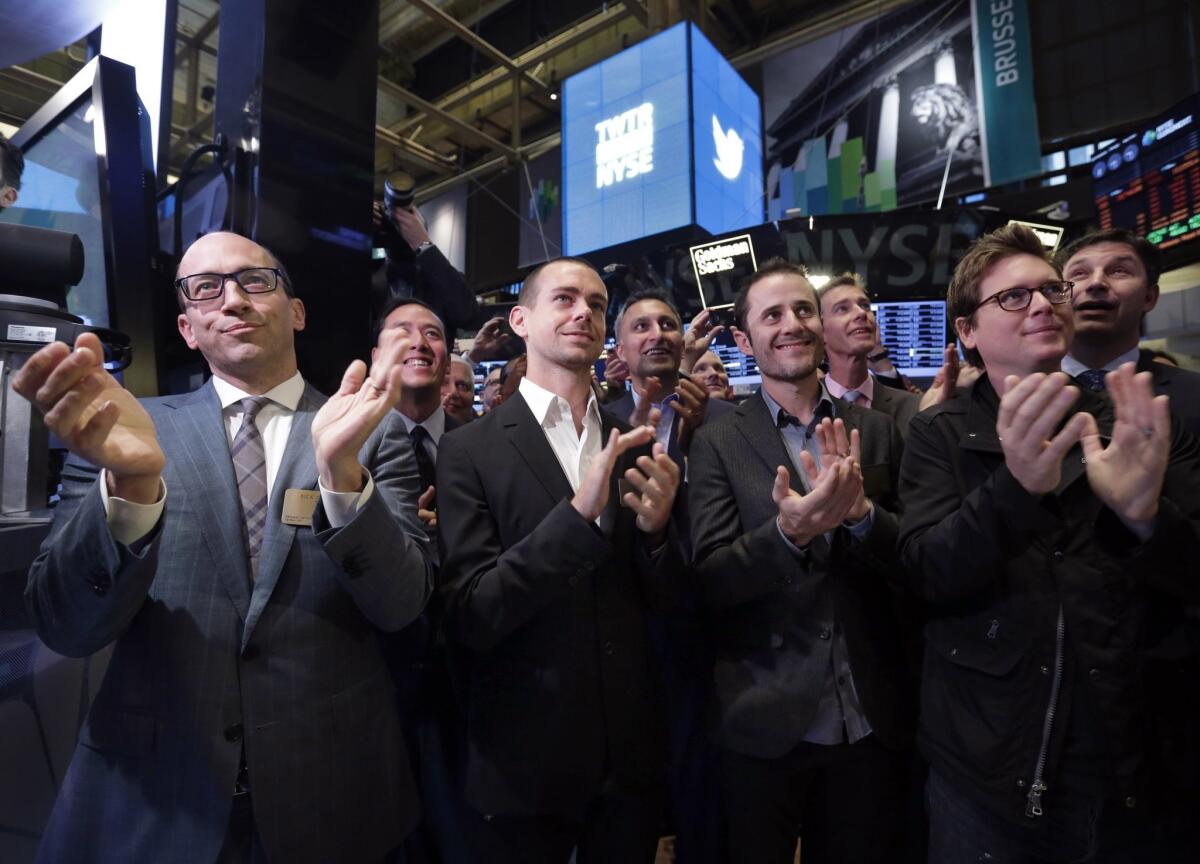Perspective: Forbes deleted a white tech writer’s article that called Silicon Valley a ‘meritocracy’

On Nov. 7, 2013, Twitter Chief Executive Dick Costolo, front row from left, Chairman and cofounder Jack Dorsey and cofounders Evan Williams and Biz Stone, applaud as they watch the ringing of the opening bell at the New York Stock Exchange. Twitter is one of many Silicon Valley companies that have released their ethnic and gender diversity data.
- Share via
Is there a diversity crisis in Silicon Valley?
Tech writer Brian S. Hall doesn’t think so. “If you aren’t able to make it here, it’s almost certainly not because of any bias,” he wrote for Forbes. Instead, he argued that anyone claiming bias should blame their own “refusal to put in the hard work.”
A mere 24 hours after the article was posted, and just as the conversation was starting to heat up on social media, Forbes deleted the article — causing even more controversy. (Emails to Forbes asking for an explanation were not answered.)
“I don’t think it should have been deleted,” said Mark Luckie, an author and former manager of journalism and news at Twitter. “It should stay up, because it’s a discussion that we need to have. But I understand why Forbes would take it down, since they probably don’t want it to represent their company.”

A screenshot of the removed article on Forbes. Requests for clarification on the nature of the Terms of Service violation were not answered.
"I’ve been called a series of bad names," said Hall, who is white, of the backlash against his article. "Nearly all focused on my physical appearance, race, gender and sexual orientation. A few also called me old."
Name-calling may be inappropriate, but Forbes’ action is understandable; Hall's piece didn't make much sense.
The first half of the article argues that because Silicon Valley is making lots of money, there can’t possibly be any sort of crisis. In the second half, Hall attempts to flatten a complicated conversation into a series of accusations:
Why did you get a humanities degree instead of a tech degree? Stop demanding that Silicon Valley make allowances for your limitations! Are you even working hard?
Chinese and Indian people are doing just fine!
The tactic of championing Asians as “model minorities” is a time-worn way to indirectly cast blacks and Latinos as whiners looking for a handout. “They work hard and succeed,” skeptics say, “so what’s your excuse?”
The trouble with this line of argument is that it doesn’t hold up, not anecdotally and not statistically. Asians and Asian Americans may be well represented in the tech sphere — they’re nearly 40% of the employee population at Yahoo, for example. But once they get in, they often face barriers such as unequal pay and promotion opportunities. For example, Asian tech workers earn an average of $8,146 per year less than their white counterparts.
But Silicon Valley isn’t just a sea of unambitious employees. Valley culture values the entrepreneurial spirit of start-ups. Leaving a big company to strike out on your own with a product that will change the world is the dream of many an entry-level engineer. But to make that happen, you need funding — venture capital.
For Tim Hwang, the chief executive and founder of Fiscalnote, this is where the real problem starts. When women and people of color look for venture capital for their own projects, they begin to hit barriers. This includes Asian Americans like Hwang.
“Venture capital is the lifeblood of a company,” Hwang said. “But the venture capital community is really homogenous.” Or, more specifically: 92% of senior investment teams are male, and 78% are white. A significant chunk of that population is over 46 years old.
But one thing that statistics don’t show, Hwang said, is that the lack of diversity may also be shaping who investors decide to fund. In general, VC people don’t take blind applications. If you want to pitch them, you’ll need a “warm” introduction — a recommendation from a mutual friend. But given that a full three-quarters of white people have no minorities in their close social network, this is difficult.
“There’s an old boys’ club in Silicon Valley,” Hwang said. “Like anywhere else.”
“I think the general concept of meritocracy makes sense,” he said. “If you do work hard, then you might get in. But [minorities] have to hustle so much harder. If my white counterpart has to jump over one hurdle, I have to jump over five, to get the same results.”
This is crucial in the start-up world, where the stakes are high. “With every challenge, your entire business could go under,” he said. “So every extra hurdle that’s put in front of you is another possibility that you’ll fail.”
Hwang, who has written about his experiences with the “bamboo ceiling,” says that he's been able to break in and navigate the VC world pretty well.
“But even when you’re in, it can be really frustrating.”
In practice, studies show that more diverse teams are more financially successful. And there’s plenty of anecdotal evidence to suggest that innovation without inclusion can be disastrous.
Last month, video of a soap dispenser that didn’t respond to black skin went viral. In 2009, Hewlett-Packard released a webcam with face-tracking technology that couldn’t track a black person’s face.
These are embarrassing problems that likely could have been prevented if there were more people of color involved in the product development and testing phase.
And as Luckie has written about diversity in Silicon Valley, if tech companies do not reflect their user bases, “they risk alienating the users most responsible for their success.”
This is advice that top-tier companies like Facebook and Twitter take seriously, especially given that minorities such as blacks and Latinos use their products at higher ratios than whites. These companies are two among many that have specific job titles focused on improving poor numbers of women and minorities in the tech workforce. Search for “inclusion” on any job board, and you’ll find a host of tech companies looking to improve their diversity.
“I think such jobs make great PR,” said Hall in an emailed statement to the Los Angeles Times. “I have doubts they will achieve anything beyond that. If they do, great.”
On Twitter, the response to the article’s content — and its deletion — was mixed. Some, like Luckie and Hwang, disagreed with Hall’s premise. Others enthusiastically supported Hall, and criticized “social justice warriors” that put pressure on Forbes.
This didn’t surprise Luckie. The idea that including more underrepresented people in Silicon Valley is counterproductive is still a commonly held viewpoint, he said.
Hall himself also poked fun at detractors on Twitter, deflecting accusations of bias by saying in numerous tweets that he is a lesbian.
He also tweeted at conservative publications Daily Caller and Breitbart to ask if they would reprint his article, but neither has done so. For now, the piece is only available on Hall's own blog.
In an emailed statement to The Times, Hall said he was speaking for a larger, but silent population:
“I strongly suspect that my view — that Silicon Valley has no diversity problem — is widely held by many in the region, possibly even a majority, but they are afraid to speak on this. I do not blame them. Look at what’s happened to me. My article was taken down 24 hours after going live. I’ve received countless tweets and emails about what an awful human being I am.”
“Certainly, this entire incident limits my prospects for writing for other sites and publications in Silicon Valley.”
The tables have turned. In an ironic twist of fate, a straight white man will now have to work harder than others to get a break in Silicon Valley.
You could call it a crisis.
Follow me @dexdigi for more on the intersection of culture and the Internet.




